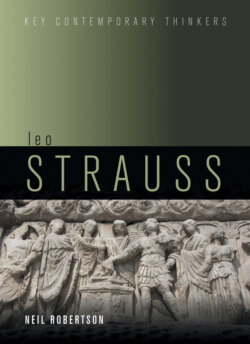Читать книгу Leo Strauss - Neil G. Robertson - Страница 15
The Thesis of this Book
ОглавлениеBeyond trying to introduce readers to the often-challenging thought of Leo Strauss, this book does have a thesis about that thought as a whole. Strauss always called himself a “scholar” and not a “philosopher.” This was not simply due to modesty on his part; it is actually central to his basic claim. If Strauss is simply recovering a pre-existing standpoint – that of classical political philosophy – his basic work is scholarly recovery. But the claim of this book is that Strauss is doing more than “scholarly recovery”: he is a key contemporary thinker precisely because his work is philosophically original. He is not simply recovering the thought of Plato, as he presents himself to be doing; nor is he simply occupying an already-established contemporary standpoint, whether it is that of Nietzsche or Heidegger, as some critics of Strauss have alleged. Strauss developed a distinctive contemporary position – and it is this distinctive position that we will be trying to uncover as we go through Strauss’s thought.
However, precisely because he is more original than he allows, Strauss’s claims to recovery are more open to question than he allows. The focus of this introduction to Strauss will be not primarily on his interpretations of specific texts, but on his own thought. That thought was undoubtedly worked out in and through his readings of ancient and modern political philosophy, but it was not determined by those texts. Our effort will be to see Strauss as himself a key contemporary thinker.
